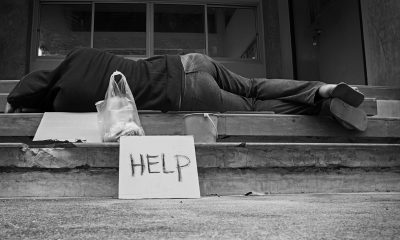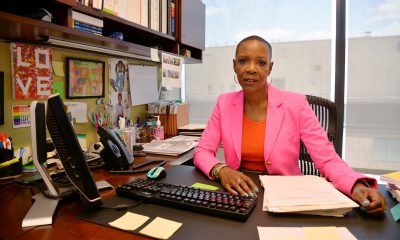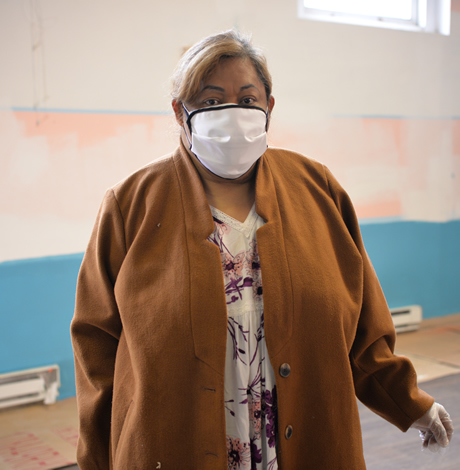Local
Local news in brief
‘Housewives’ charity event a bust & more

‘Housewives’ charity event a bust
A party for “Real Housewives of D.C.” held at the now-closed EFN Lounge on Aug. 5 with show stars Tareq and Michaele Salahi raised no money for an AIDS charity.
Ads for the event said an unspecified portion of the proceeds would be given to Dab the AIDS Bear Project, an organization that, according to its founder, works in collaboration with the Jacksonville Area Sexual Minority Youth Network, a registered 501c3 organization.
The Blade could not independently confirm the connection between the two organizations before deadline, but Dab Garner, founder and CEO of Dab the AIDS Bear Project said Howard Cromwell, a gay Washingtonian who publishes D.C.’s Most Fabulous Magazine, told him that the event, was not successful and therefore no donation would be made.
Cromwell, who asked that questions about the event be submitted via e-mail and then did not respond, told Garner in an e-mail dated Aug. 12 that he couldn’t send any money to the charity because the event was not profitable.
“The goal was to donate 40 percent of the profit to each organization,” Cromwell wrote in the e-mail, which Garner shared with the Blade. “Unfortunately, we did not pull a profit from this event as expected. We barely broke even. Even though this event wasn’t financially successful for the charity organizations involved, we feel that it was still a huge success media-wise shedding a national spotlight on your organization.”
Garner said he sent teddy bears for the housewives to pose with for publicity shots at the party, but Michaele Salahi was the only cast member to attend. Other cast members attended a separate and official premiere party for the show.
Cromwell, Garner said, forgot to bring the teddy bears to the party and hasn’t returned them. Garner uses the teddy bears to promote his charity.
Garner, a 29-year HIV survivor, met Cromwell last year at an AIDS Drug Assistance Program Summit in Washington and said Cromwell approached his organization about being a benefactor of the “Housewives” party.
Other groups appear to have also been jilted. The New York Post reported that Honor & Remember was to receive 40 percent of the profits from Cromwell’s event, but also was told the event made no money so no donation would be given. Staff at Honor & Remember did not respond to the Blade’s requests for comment.
Tickets for Cromwell’s party ranged from $25 to $500. Press that attended described EFN Lounge as somewhat full downstairs, but not packed.
Bill Gray, who was manager of EFN Lounge at the time of the event and on scene that night, said the event seemed chaotic.
“They comped most of the tickets for press and their friends,” he said. “It seemed like a joke.”
Gay comedian to entertain at Alston House benefit
D.C.-based gay standup comedian Sampson will entertain tonight at 10 p.m. at the D.C. Arts Center in Adams Morgan with his routine, “Don’t Make Me Take Off My Earrings.”
Tickets are $15 and benefit the Wanda Alston House, Washington’s only home for homeless LGBT youth.
Sampson, born Korrell McCormick, grew up in North Carolina, but has been in the D.C. area for 10 years. The 25-year-old has been doing standup for about eight years and mixes social commentary with personal experiences about the foibles of the black and gay worlds, which often collide, a point he uses for comedic effect.
He performs in straight and gay venues alike and says it hasn’t been a problem.
“I’m just as funny as some of the straight comedians,” he says. “I don’t use the N-word and a bunch of [expletives]. It’s a different perspective, being openly gay. I can get away with more. Even flirting with men in the audience. Even the straight ones. They’re there to laugh and have fun, so they just go with it.”
Sampson, who has performed at Titan, Town, EFN Lounge and Phase 1, says tonight’s performance is inspired by his sense of activism.
But how does he balance the seriousness of his convictions with the lighthearted approach of a comedian?
“I still don’t know,” he admits. “Honesty can be very funny and open a lot of dialogue through pointing out the absurd. That’s what makes it funny. People don’t stop to examine how they sound.”
Brian Watson, who oversees Wanda’s House as a division of Transgender Health Empowerment, says the benefit was Sampson’s idea. Watson says he’s grateful for the aid.
“Things are going OK at the House, but we received a budget cut last year and are expecting one this year also,” he said. “Due to limited income this year, we aren’t even having our annual anniversary reception usually held in September.”
Watson said the House is full and has “a good group of kids,” but Transgender Health Empowerment will have to close its trans drop-in center on New York Avenue, N.W., this year because of the lack of funding through D.C. City Council members’ earmarks, which helped keep the drop-in center’s doors open.
Tickets for tonight’s performance can be purchased at the door or reserved by calling 202-462-7833. Guests are asked to arrive around 9:45 p.m. Visit www.sampson313.freehomepage.com for more about Sampson.
Two gay men punched en route to Nellie’s
A gay man who was walking along the U Street corridor with another gay man toward Nellie’s on Aug. 20 was attacked at about 11:30 p.m., one of the men told the Blade.
And minutes after being punched, the man said, they encountered another gay man who also was attacked.
The gay man who wasn’t attacked, a 27-year-old Columbia Heights resident who asked not to be identified because he does security work for an overseas non-profit, said he and his friend, who’s 31, had met on the corner of 14th and U streets, N.W., and were walking east on U Street when the attack happened near the Rite Aid between 13th and 14th streets.
“There were tons and tons of people out,” said the man who wasn’t attacked. “We were just walking and talking, passing tons of people, and all of a sudden I saw someone turn around and I had that ‘something’s not right’ feeling really quickly.
“They hit my friend on the side of the head. … My friend turned and was like, ‘What happened?’ and was looking to see, and the same person and one other person threw a couple more punches and then it just kind of ended itself. I got my friend sort of distanced away enough and those people kept walking.”
The man who wasn’t attacked said the group consisted of three young black men and two young black women whom he guessed were either coming or going from one of the straight bars on U Street. He said the group didn’t say anything to them or appear to be trying to rob them.
He said one man in the group was “thin and wiry.” Another was “heftier,” and a third was a “bigger guy” with shoulder-length dreads who did most of the punching. He noted that there was no verbal exchange during the attack, but the two girls laughed while his friend was being punched.
Seconds after the attack, another gay man approached them and asked if they’d been attacked, saying he had just been punched as well. The man who wasn’t attacked said the other gay man, whom he didn’t know, also was en route to Nellie’s when he was punched by the same group. They called police and waited together. Neither man who was attacked was seriously injured.
The man who wasn’t attacked said he believes they were targeted because they are gay.
“I don’t know for sure because they didn’t say anything, but there were so many people around, they could have caused problems with anyone, but we were attacked. Then like 15 seconds later another gay guy is attacked on the same block? There’s no doubt in my mind that’s what it was.”
Police arrested Tracee Freeman on Aug. 20 on simple assault and hate crime charges stemming from an incident at 1448 U Street at 11:16 p.m. that day. It wasn’t immediately clear if the incident tied to Freeman’s arrest was the same attack reported above or another attack. The victim cited in the police report said Freeman punched him in the chest and called him a faggot, according to the report.
Virginia
Va. lawmakers consider partial restoration of Ryan White funds
State Department of Health in 2025 cut $20 million from Part B program

The Virginia General Assembly is considering the partial restoration of HIV funding that the state’s Department of Health cut last year.
The Department of Health in 2025 cut $20 million — or 67 percent of total funding — from the Ryan White Part B program.
The funding cuts started with the Trump-Vance administration passing budget cuts to federal HIV screening and protection programs. Rebate issues between the Virginia Department of Health and the company that provides HIV medications began.
Advocates say the funding cuts have disproportionately impacted lower-income people.
The Ryan White HIV/AIDS Program, a federal program started in 1990, provides medical services, public education, and essential services. Part B offers 21 services, seven of which remained funded after the budget cuts.
Equality Virginia notes “in 2025, a 67 percent reduction severely destabilized HIV services across the commonwealth.”
Virginia lawmakers have approved two bills — House Bill 30 and Senate Bill 30 — that would partially restore the funding. The Ryan White cuts remain a concern among community members.
Both chambers of the General Assembly must review their proposed changes before lawmakers can adopt the bills.
“While these amendments aren’t a full restoration of what community-based organizations lost, this marks a critical step toward stabilizing care for thousands of Virginians living with HIV,” said Equality Virginia Executive Director Narissa Rahaman. “Equality Virginia plans to continue their contact with lawmakers and delegates through the conference and up until the passing of the budget.”
“We appreciate lawmakers from both sides of the aisle who recognized the urgency of this moment and will work to ensure funding remains in the final version signed by the governor,” added Rahaman.
District of Columbia
D.C. Black Pride theme, performers announced at ‘Speakeasy’
Durand Bernarr to headline 2026 programming

The Center for Black Equity held its 2026 DC Black Pride Theme Reveal event at Union Stage on Monday. The evening, a “Speakeasy Happy Hour,” was hosted by Anthony Oakes and featured performances by Lolita Leopard and Keith Angelo. The Center for Black Equity organizes DC Black Pride.
Kenya Hutton, Center for Black Equity president and CEO, spoke following the performances by Leopard and Angelo. Hutton announced this year’s theme for DC Black Pride: “New Black Renaissance.”
Performers for 2026 DC Black Pride were announced to be Bang Garcon, Be Steadwell, Jay Columbus, Bennu Byrd, Rue Pratt and Akeem Woods.
Singer-songwriter Durand Bernarr was announced as the headliner for the 2026 festivities. Bernerr gave brief remarks through a video played on the screen at the stage.
DC Black Pride is scheduled for May 22-25. For more information on DC Black Pride, visit dcblackpride.org.
Virginia
Arlington LGBTQ bar Freddie’s celebrates 25th anniversary
Owner asks public to support D.C.-area gay bars

An overflowing crowd turned out Sunday night, March 1, for the 25th anniversary celebration of Freddie’s Beach Bar, the LGBTQ bar and restaurant located in the Crystal City section of Arlington, Va.
The celebration began as longtime patrons sitting at tables and at the bar ordered drinks, snacks, and full meals as several of Freddie’s well-known drag queens performed on a decorated stage.
Roland Watkins, an official with Equality NoVa, an LGBTQ advocacy organization based in the Northern Virginia areas of Arlington, Alexandria, and Fairfax County, next told the gathering about the history of Freddie’s Beach Bar and the role he said that owner Freddie Lutz has played in broadening the bar’s role into a community gathering place.
“Twenty-five years ago, opening a gay bar in Arlington was not a given,” Watkins told the crowd from the stage. “It took courage, convincing, and a deep belief that our community belongs openly, visibly, and proudly,” he said. “And that belief came from Freddie.”
Watkins and others familiar with Freddie’s noted that under Lutz’s leadership and support from his staff, Freddie’s provided support and a gathering place for LGBTQ organizations and a place where Virginia elected officials, and candidates running for public office, came to express their support for the LGBTQ community.
“Over the past 25 years, Freddie’s has become more than a bar,” Watkins said. “It has become a community maker.”
Lutz, who spoke next, said he was moved by the outpouring of support from long-time customers. “Thank you all so much for coming tonight and thank you all so much for your support over the past 25 years,” he said. “I can’t tell you how much that means to me and how much it’s kept me going.”
But Lutz then said Freddie’s, like many other D.C. area gay bars, continues to face economic hard times that he said began during the COVID pandemic. He noted that fewer customers are coming to Freddie’s in recent years, with a significant drop in patronage for his once lucrative weekend buffet brunches.
“So, I don’t want to be the daddy downer on my 25-year anniversary,” he said. “But this was actually the worst year we’ve ever had,” he added. “And I guess what I’m asking is please help us out. Not just me, but all the gay bars in the area.” He added, “I’m reaching out and I’m appealing to you not to forget the gay bars.”
Lutz received loud, prolonged applause, with many customers hugging him as he walked off the stage.


















